
Week of April 18, 2004

Häx Cel came together in Hanover, capital city of Lower Saxony, in late 1971 with the aim of combining classical music (Händel, Albinoni, Bach, Vivaldi and Beethoven) with progressive rock. If it was not the first attempt of that kind - and the band had never claimed that it was - it was certainly a very successful one. The line-up consisted of Michael Moebus (b. 3/10/1949, Bremen) on bass guitar and vocals, Achim Neubauer (b. 4/11/1952, Hanover) on electric piano, Rainer Greffrath (b. 2/5/1949, Hanover) on drums and Dieter Neumann (b. 12/18/1950 in Hanover) on flute and vocals. Quite intentionally they decided against the use of the otherwise ever-present guitar. The band name is a bowdlerisation of the German word "Häcksel", which means "chaff"/"shreds", as some of their tracks were comprised of various elements or "chaffs".
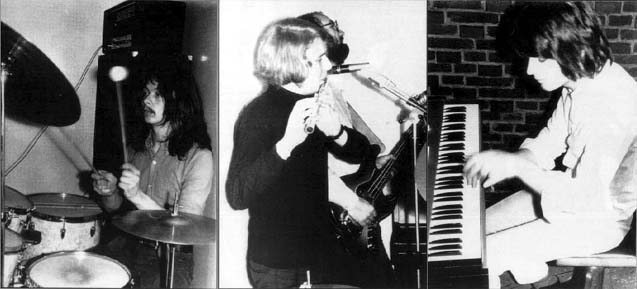
Their first gig dates back to 1/28/1972; it took place in Bremen, with the first live radio show following very quickly on NDR2 on 3/2/1972. After one of their gigs, jazz drummer Dietmar Siebrasse, owner of the small Dizzy Records label, being apparently quite enthusiastic about the band, approached them suggesting a recording session, an offer the band was very happy to accept. In the Spring of 1972, the first 7", "Albinoni”/”Difference" (Dizzy Records DS 723) appeared on the market. The cover features a totem of the Canadian Haida Indians. On 29th October, 1972, they recorded a live gig in the Beethovensaal, Hanover, which was released that same year as an LP under the title, "Zwai" (Dizzy Records LP DS 726), technically their second release.
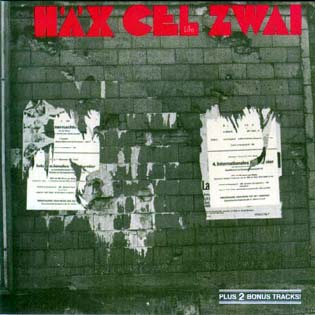
Again, we are dealing with a concocted name derived from the German word "zwei" (two). Although current anthologies date the LP to 1973, this is evidently wrong, as Michael Moebus says: "We had the LP in our hands in 1972". The authors were apparently unable to imagine that only two months had passed between the recording of the LP and its release, thus suggesting 1973 as the date of publication.
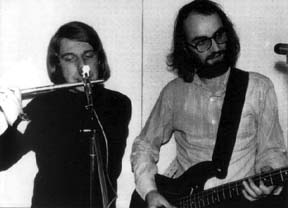
Sometimes things happen faster than you might realise. Häx Cel were
not thrilled with the cover design featuring a grey wall, but it was too late to
do anything about it, as they were presented with the finished product. Another
embarrassing factor was the spelling on the back side of the LP: "Live" was
misspelled as "Life" and "Bourée" - with double "r". Except for two pieces by
Händel, the music was self-composed. As far as the circulation of both LP and
single is concerned, there is no reliable data as it turned out to be impossible
to trace Dietmar Siebrasse (aka Dizzy Brassé); his label had ceased to exist.
The Beethovenhalle gig was their last concert, which means that the band existed
for less than a year. Achim Neubauer intended to study in Bochum, and Michael
Moebus had meanwhile spent some time in the USA - enough reasons for the band to
split up.
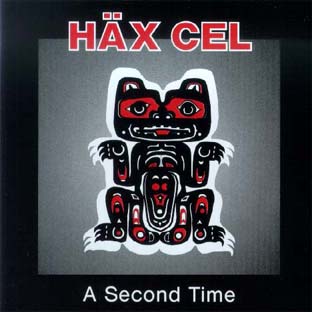
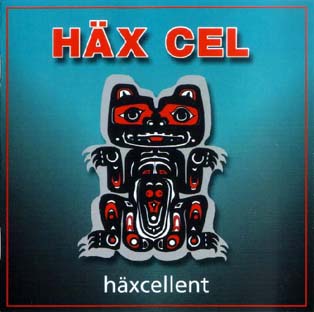
In the Summer of 1996, the band met again and decided to reform. Since Rainer
Greffrath had meanwhile moved to Bremen, he was replaced by Michael Fromm on
drums, and this time, a guitar was included: the son of music teacher Dieter
Neumann, Tobias, took over, with the band's style remaining unchanged. In 1998,
they released their CD, "A Second Time", followed by the next vintage album
"Häxcellent" in the Summer of 2001. Both releases feature new and rearranged old
recordings.
The LP's value has risen to around US$200 in mint condition, which meant a
viable proposition for Garden Of Delights to release "Zwai" on CD. For the bonus
material, they’ve added the two tracks off their 7", which means that "Albinoni"
appears twice - as a live version off the LP and as the studio version off the
single, the latter featuring an organ. Since neither the master tapes of the
first record nor the NDR2 live tapes were available, the tracks were taken from
a record LP in prime condition, using Cedar's digital NoNoise system, the best
of all, to "uncrackle" the sound. This system gets rid of any groove noise
without significantly changing the sound of the original.
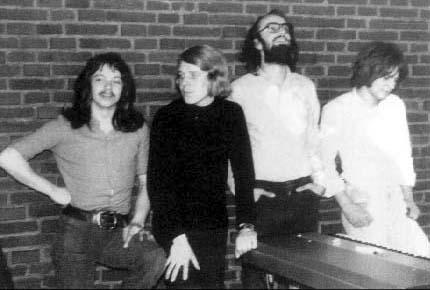
Finally, as part of our habitual service, two comments on Häx Cel to be found in the relevant anthologies: In "Cosmic Dreams At Play", Dag Erik Asbjørnsen writes: "This obscure band's album 'Zwai' gives no information about who they were. It is a quiet, soft and classically influenced album recorded live. The material was written by the group, except for the inclusion of two short Handel compositions. There was massive use of flute but no heavy guitar passages. Some of the tracks like 'A Second Time', are quite good, if a bit lightweight. An interesting album with an uncommon musical style." In "The Crack In The Cosmic Egg", Steven and Alan Freeman only give a short comment: "Apparently some sort of classically influenced band, as the album features interpretations of Händel compositions."
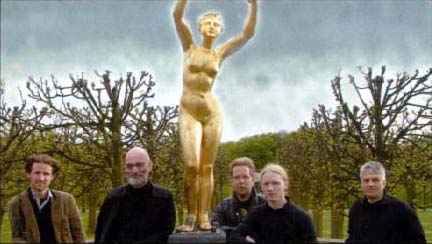
It seems as if the two brothers were not able to find a Häx Cel record
in England. This is no surprise since even Achim Groh's discography, "Aus
deutschen Landen" (Mannheim 1992) does not list the band. Their 7" has so far
been totally unknown even among collectors.
Many thanks to Achim Neubauer and Michael Moebus for their friendly help.
M. Thurn
Taken from the CD reissue of “Zwai” (Garden of Delights, 2001, CD056)